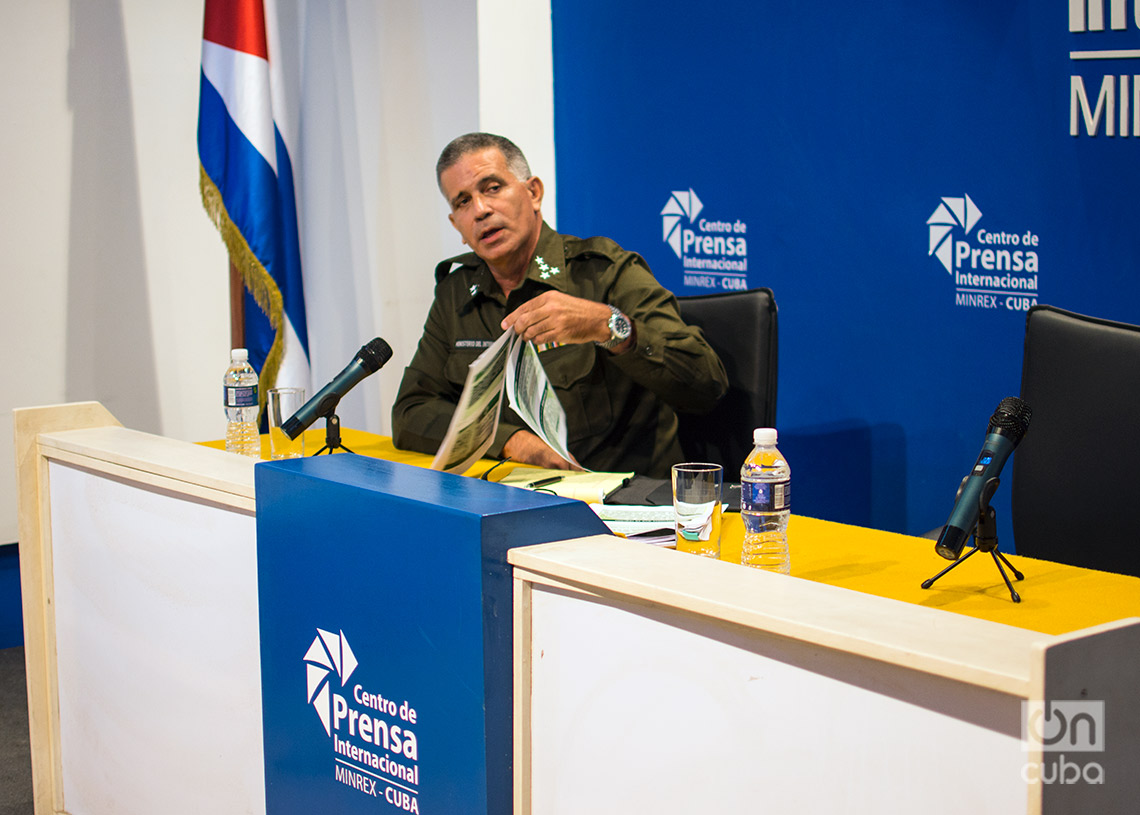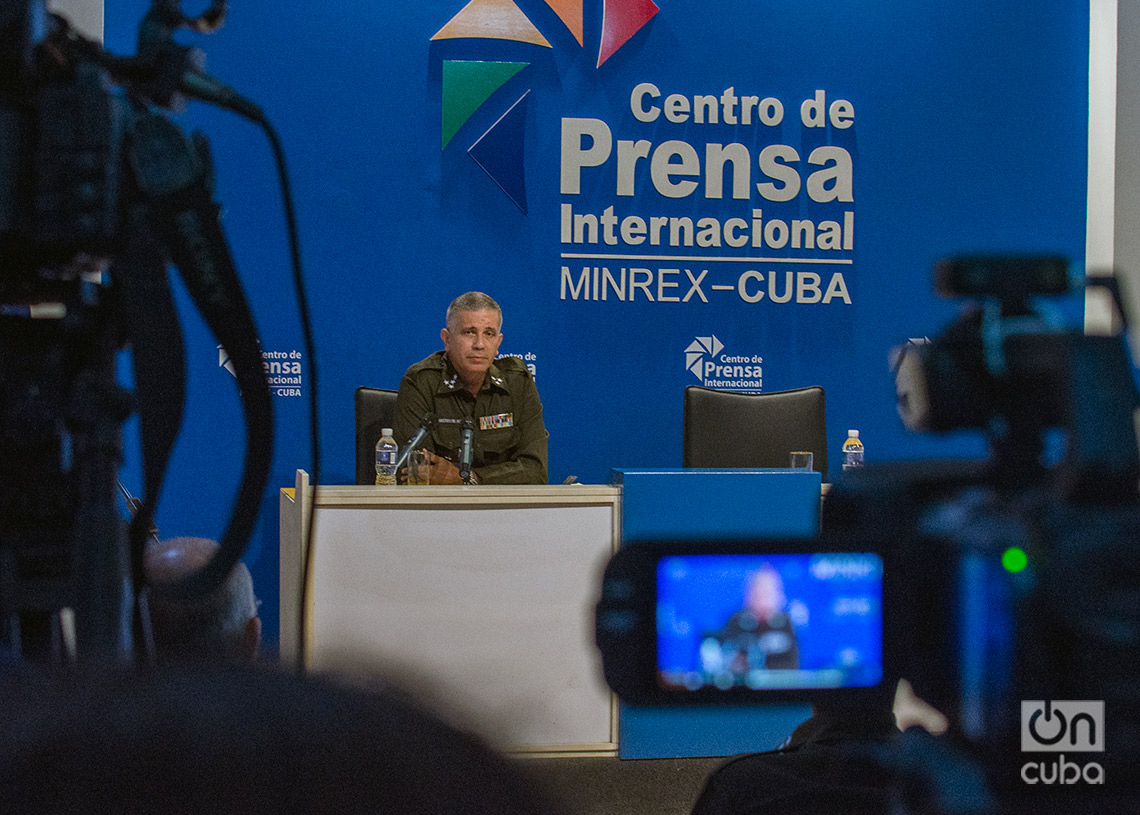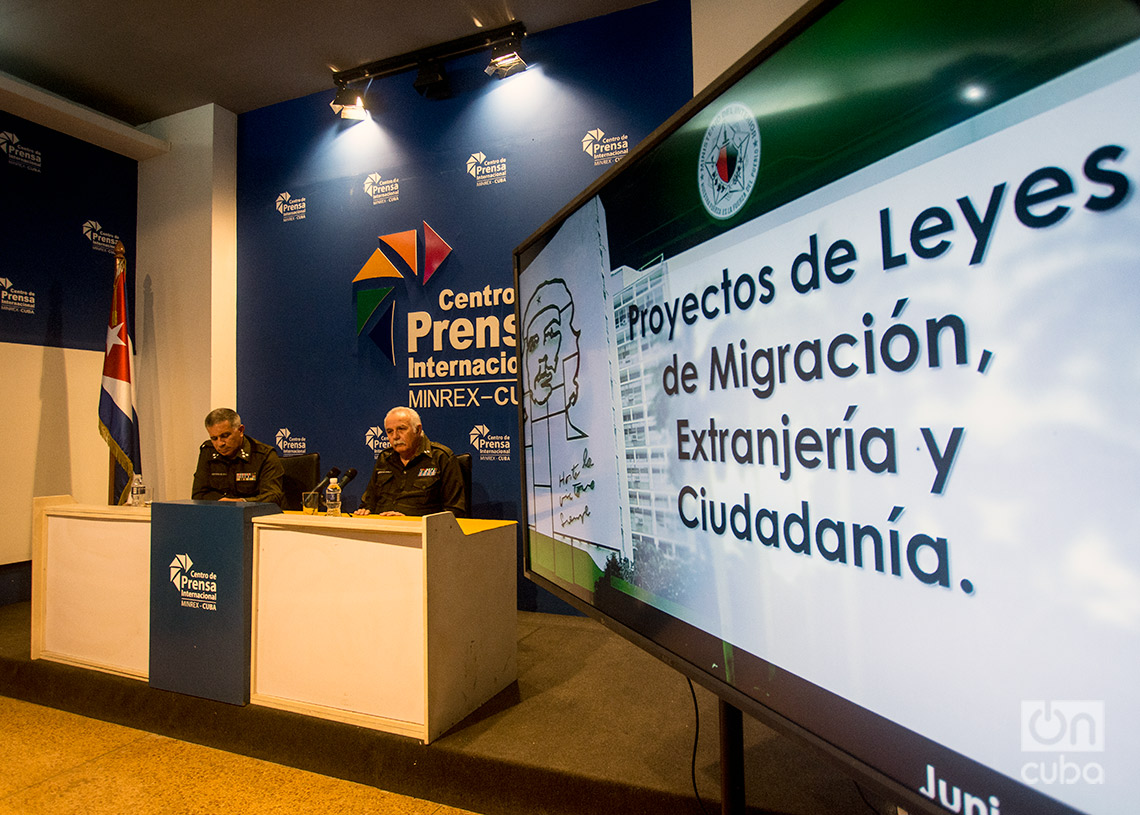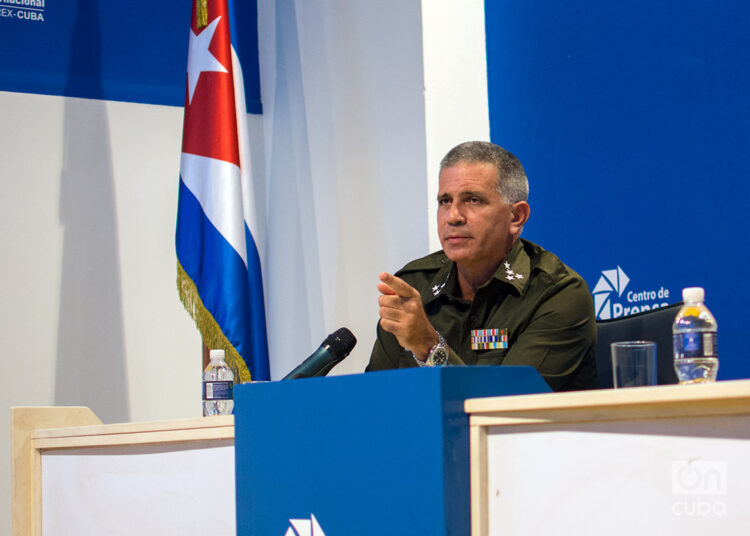No resident abroad will lose property on the island as a result of the new Law on Migration, whose approval in Parliament is previewed for July, according to Cuban authorities.
“No one for being a resident abroad loses his home, nobody loses his car, no one loses a property. The law does not say that and we ratify that no one loses it. In that we are categorical,” said First Colonel Mario Méndez Mayedo, head of the Identification, Immigration and Aliens Department of the Ministry of Interior (MININT).
In a press conference in Havana, the high-ranking officer explained that “all persons who since 2013 maintained their residence in the country, although they also live abroad, are favored by this law and do not lose any patrimonial rights.”
In this regard, he pointed out that those who are in that situation ― which covers 1,300,000 people ― “retain their full rights in Cuba and have no limitations for their properties.”
“The commitments contracted by the country with the moratorium (established as a result of the pandemic) will be fulfilled. The commitments we have with the people who resettled in Cuba, the well-known repatriation process, will be respected,” he promised.

From emigrants to residents abroad
Méndez Mayedo also announced that the government will gradually give “all facilities” so that the emigrant who so decides obtains the status of resident abroad.
“When obtaining residence abroad, they begin to have rights that today they do not have, because at the time the law established those limitations. And what this law intends is to take a step in advance in that regard,” the senior officer said.
It should be remembered that currently a significant number of Cubans are legally considered emigrants, by the current law.
These are people who did not carry out the repatriation process after fulfilling more than 24 months outside the island, and who were in this situation before the moratorium still in force eliminated in practice the obligation of that limit. Therefore, they not only lost their residence in Cuba automatically but also the rights and guarantees that this condition involves.
Those today legally considered emigrants will continue to be thus after the entry into force of the new Law on Migration since it is not retroactive. Therefore, to obtain the status of residents abroad, emigrants must meet the corresponding requirements and procedures, established in the legislation itself.
A law to add. Cubans with the I-220A
“No one can think that we are going to make a law to subtract, this is a law to add,” said the first colonel, who to support the inclusive nature of the legislation cited the example of the more than 300,000 Cubans found in migratory limbo in the United States under the condition of Order I220A.
The I-220A form is a “provisional freedom” under parole,” which the U.S. government offers to people who were arrested by the immigration authorities and then were released.
These Cubans “have no residence in the United States, it is not known when they would have it, there are up to 2028 planned trials, but if they are in the moratorium they do not lose any right in our country, even in these cases. There is no setback, in that we are categorical, there is no limitation of rights,” Méndez Mayedo insisted.
In this complex migratory context, the head of the Identification, Immigration and Aliens Department criticized Washington’s policies towards the island.
“The U.S. embassy still does not give non-emigrant visas. Cubans have to travel to a third country to temporarily travel to the United States” and even so it is not certain that they get it. This has been proven by hundreds of cases processed in Guyana, where the entry permit to U.S. territory, home of the largest Cuban community abroad.
Public opinion
The migration bill will be debated ― and presumably approved ― in July by the Cuban Parliament, together with the aliens bill. With XIV titles, 21 chapters, 18 sections and 176 articles, the bill seeks to “adapt” Cuba’s legal body to the new migratory realities of the island, in the middle of the wave of national migrants to the United States, a country to which according to estimates more than half a million Cubans have arrived in just the last two years.
According to Méndez Mayedo, the bill published a few days ago is the result of four years of analysis, consultations, and writing. Its writing staff took into account professional and citizen opinions, the latter through their publications on official websites such as Cubadebate.
In opinion polls, explained the senior officer, it was shown that the fundamental public priority revolved around the issue of effective residence. The opinions, questions, and doubts about it captured between 60% and 70% of the contacts, either by email or in the comments on social media.
Effective immigration residence and the end of 24 months
The concept of effective immigration residence establishes that such a category is the “condition that Cuban citizens and resident foreigners reach when they remain during each calendar year, before the date on which most of their time in the national territory or through a combination of a period of permanence and other material evidence that demonstrates roots in the country.”
According to the first colonel, the accumulated time will be defined in the regulations of the law, still under study; but, according to the source, it will be a cumulative and not continuous period, “which gives more facilities to enter and leave according to the dynamics of each of their lives.”
For the authorities, the category of effective immigration residence offers “objectivity of information on people residing in Cuba and abroad, which could impact public policies and reduce additional costs for the country’s economy.”

In addition, the head of the Identification, Immigration, and Aliens Department of the MININT reiterated that the new law eliminates the term of 24 months to remain abroad without losing residence on the island so that the time of stay outside the country “does not have limits.”
When such a measure is arranged, the increase in the emigrant status is stopped.
“The time has come when this emigrant condition is eliminated from our legislation, or at least that this condition will no longer be issued,” said the senior MININT officer.
“Migratory regulations are incorporated ― and this is a matter of concern, deferred for the moment to the regulations of the law and other regulations ― that respond to the challenges imposed to determine the residence of the Cubans in Cuba and abroad, and in turn, the exercise of the rights related to the availability of the patrimony of the national territory,” he said.
According to Méndez Mayedo, today there are 41,522 Cubans who reside abroad “walking through our streets.”
“That is no problem,” he said.
As for business investors, a category that appears in the bill, the officer considered that it should not aspire to the migration law “fully resolving the problem.”
However, he said, the legislation “creates the foundation so that, according to our socioeconomic model, those residents abroad with intentions to invest in our country have certain migratory facilities.”
In fact, in the legislation in force since 2012, the assets in the hands of foreign investors are regulated, and enjoy “full rights as a permanent resident would have,” he added.
Citizenship and passport
One of the most commented issues in social media and alternative media circuits are the provisions around citizenship ― a subject about which a bill was also published ― and the use of the passport in the new Law on Migration.
“To enter and leave the country, the Cuban passport is required, that is not negotiable. It is a constitutional and sovereign decision,” said the high-ranking MININT officer, adding that in Cuba “all acts carried out with another citizenship are null to take effect in our country.”
The established regulation is that the acquisition of citizenship can be by birth or by naturalization, but there are new aspects in the bill that will be discussed in July.
Now the children of Cubans on official missions abroad will be considered nationals, as well as the children of Cubans who reside abroad and whose citizenship was not recognized in their birthplace, so they were considered stateless in practice.
It must be remembered that already in October 2017 changes had been established in immigration policy, among which was the elimination of the requirement of domicile in Cuba so that the children of Cubans residing abroad, born abroad, could obtain Cuban citizenship.
According to Méndez Mayedo, in this regard, more than 5,300 Cuban citizenships have been granted. Most of them to minors, but there are also adults.
“We estimate that in the world there are more than one million children of Cubans, and this really demonstrates the potential that this has for migratory work and for the future,” he said.
Similarly, recognition of grandchildren born abroad of Cubans born in Cuba is incorporated in the bill, “provided they meet the legal requirements and formalities” for it.

Relinquishment of Cuban citizenship
A very delicate issue is the relinquishment of citizenship, a process that can only be initiated by interested parties if they reside outside Cuba and if, in addition, they have another nationality, because “we do not accept cases of statelessness…. No one can relinquish Cuban citizenship if they do not have another,” said the first colonel.
For such application to be valid, it will have to be authorized by the competent authority and the corresponding document must be issued by a Cuban official.
For its part, the deprivation of citizenship by the authorities ― something conceived in the bill regarding this issue ― is “extraordinarily exceptional and we have only applied it exceptionally to the Bay of Pigs invaders,” the officer recalled.
To alienate Cubans of their citizenship, as established by the legislation, the essential cause is “enlisting in any type armed organization intending to attempt against the territorial integrity of the Cuban State, its citizens, and other persons residing in the country.”
As well as, “from abroad, performing acts contrary to the high political, economic and social interests of the Republic of Cuba, provided that it is considered by the corresponding citizenship authority.”
Cubans in Russian trenches and possible suspicions
To a question from France Press news agency about whether such a denationalization figure could fall on Cuban civilians who are fighting for Russia in the war in Ukraine, the head of the Identification, Immigration and Aliens Department of the MININT specified that it is not applied in that case.
“The legislation specifies what it means to enlist in any type of armed organization to attempt against the territorial integrity of the Cuban State,” he explained.
Regarding its approval and entry into force, Méndez Mayedo said that “the idea” is to have in 2025 “these immigration laws implemented with their respective regulations if the National Assembly decides to approve them.”
“The regulation will be consistent with what the law establishes. There is no suspicion,” said First Colonel Mario Méndez Mayedo, after answering a question from AP news agency about eventual subterfuges that could contain the small print of the regulations.










